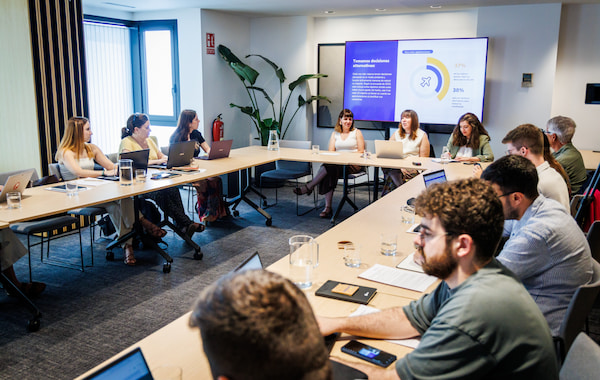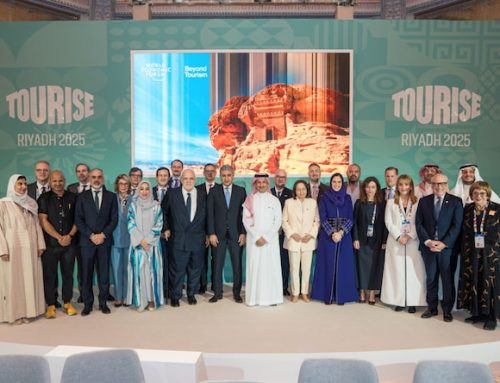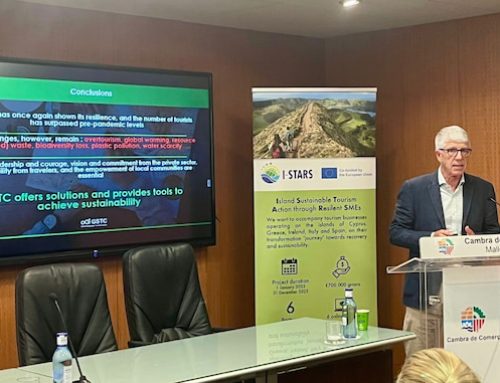

Based on a global survey of over 32,000 travelers across 34 countries and territories, the 2025 report provides insights into the evolving attitudes and behaviors of travelers regarding sustainability in travel.
Held at the Harmon office on Calle Serrano, the event brought together a small group of tourism stakeholders and media representatives for a focused discussion under the theme “Responsible Tourism: Keys for Sustainable and Competitive Development.” The session, moderated by Marta Barahona, Sustainability Director at Harmon, featured contributions from Ana Abade Gil, Head of Public Affairs at Booking.com, Gorka Rosell, Director of SleepN Atocha and Luigi Cabrini, GSTC Chair. Participants explored how collaboration across sectors can support a responsible and resilient industry.


“True sustainability in tourism requires more than good intentions; it demands shared values, informed choices, and a collective vision. The GSTC Standards serve as a compass on this journey, guiding the sector toward a future where tourism is not only viable, but also strengthens communities, protects ecosystems, and enriches the lives of both visitors and local residents alike.” Said Luigi Cabrini, GSTC Chair.
Ana Abade, Public Affairs Manager for Spain and Portugal at Booking.com, highlighted that “Sustainability has become a key and strategic area. There are increasingly more hotels with sustainable certification and a greater number of professionals with specific training in this field compared to a year ago. Additionally, public administrations should stop focusing solely on counting tourists and start evaluating how resources are managed to improve residents’ quality of life.”
Finally, Gorka Rosell, Director of Sleep’in Atocha, pointed out that: “We know our guests choose us not only for our service but also for our commitment to sustainability. True sustainability comes from the heart — it requires passion and the full engagement of every team member to make it a shared journey.”
Booking.com’s 2025 Research Reveals Growing Traveler Awareness of Tourism Impact on Communities Both at Home and Abroad
The latest data from 2025 shows a shift in traveler perceptions of what sustainability encompasses. For the first time, more than half of travelers (53%) are now conscious of tourism’s impact on local communities as well as the environment.
- While 57% of travelers feel that tourism has a positive impact overall where they live, they also highlight challenges, including traffic, littering, overcrowding, and a rising cost of living.
- By 2025, 93% of global travelers say they want to make more sustainable travel choices, and to some extent, have done so.
- Travelers are increasingly committed to supporting the economies of the destinations they visit, with 73% wanting the money they spend to go back to the local community, and two-thirds (69%) wanting to leave places better than when they arrived.
- Traveling more sustainably remains important for most travelers (84%). Looking back over the decade, the data shows how it has become a larger priority for many when planning trips. Back in 2016, less than half (42%) of global travelers believed they traveled more sustainably.
During this time, many habits related to waste reduction and energy consumption have become increasingly mainstream and remain top choices when travelers consider the impact of their trips. In 2020, 43% of travelers reported turning off the air conditioning/heater in their accommodation when they weren’t present, and by 2023, this had increased to 67%. This year’s research shows that behaviors relating to community and economic impact now sit alongside these environmental choices, with travelers consciously considering ways they can minimize the impact of the destinations they visit, whether that’s seeking advice on travel at other times of the year (39%) or visiting alternative destinations to avoid overcrowding (36%).
–
Booking.com officially joined as a member of GSTC’s global network in 2019. If you want to learn more about becoming a GSTC Member, click here for more information.
As part of the GSTC Market Access Program, Booking.com highlights GSTC-certified hotels on its platform, enabling travelers to identify and select more sustainable accommodation options.
Hotels that follow sustainability standards and wish to stand out with a reputable certification as a sustainable hotel should seek sustainable hotel certification by a GSTC-accredited Certification Body.
About Booking.com
Part of Booking Holdings Inc. (NASDAQ: BKNG), Booking.com is one of the world’s leading digital travel platforms. Its mission is to make it easier for everyone to experience the world by investing in technology that helps remove friction from travel. Booking.com connects millions of travelers with memorable experiences, a range of transportation options, and incredible places to stay – from homes to hotels and much more. With support available in 46 languages, Booking.com operates globally to empower people to explore the world sustainably.
About GSTC
The Global Sustainable Tourism Council® (GSTC®) establishes and manages global sustainable standards, the GSTC Standards, also known as the GSTC Criteria. The GSTC Destination Standard for public policy-makers and destination managers, GSTC Hotel Standard & GSTC Tour Operator Standard, GSTC MICE Standard for Venues, Event Organizers, and Events & Exhibitions, and the GSTC Attraction Standard for tourist attractions such as theme parks, museums, and national parks. These are the guiding principles and minimum requirements that any tourism business or destination should aspire to reach in order to protect and sustain the world’s natural and cultural resources while ensuring tourism meets its potential as a tool for conservation and poverty alleviation.
The GSTC Standards form the foundation for GSTC’s assurance role for Certification Bodies that certify hotels/accommodations, tour operators, and destinations as having sustainable policies and practices in place. GSTC does not directly certify any products or services but provides accreditation to those that do.
GSTC is an independent and neutral USA-registered 501(c)3 non-profit organization that represents a diverse and global membership, including national and provincial governments, leading travel companies, hotels, tour operators, NGOs, individuals and communities – all striving to achieve best practices in sustainable tourism. The GSTC is an ISEAL Community Member, a global membership organization for ambitious, collaborative, and transparent sustainability systems.
Information for media and the press: www.gstc.org/about/for-the-press/



